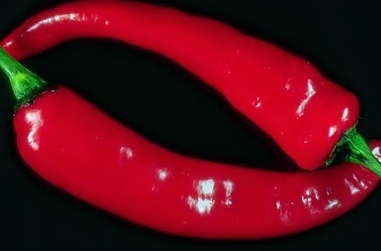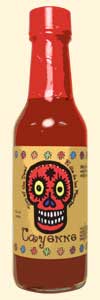
We use ground cayenne pepper in the Master Cleanse. We combine
it with fresh lemon juice, water, and maple syrup to make a drink
which loosens the old fecal matter and other intestinal debris and
flushes it out of our system. I consider cayenne the active ingredient
of the lemonade and like to refer to the lemonade as my "cayenne
delivery system". The recipe calls for 1/10th teaspoon per drink
and yet most of us end up using more as our body adjusts to the
pepper.
Recently one of our fasters, Detour, did an experiment and
really increased the amount of cayenne per drink. I remember one
of his comments about this was that the eliminations were so more
productive it was as if he were just starting the cleanse all over.
Well, his success amping up the dose of cayenne encouraged some of
us to try it. I can say that I can second his opinions and am equally
impressed with the cleansing action of the cayenne.
I would like to put forth this analogy....its like when you are
trying to get layers of wallpaper off in a room. You spray the
solution, and as far as it can soak in, you can scrape off the
old wallpaper. Likewise, when you use more cayenne, it seems to
loosen more, and more is sloughed out of our system.
The original amount of pepper, 1/10th teaspoon, is also effective,
but for those who are risk-takers or adventureous, the more the
better can apply. The hotter, the better!
Cayenne is also rated in heat units (HU) on the Scoville Scale.
The higher the number, the hotter the cayenne. Here is a link to
a pretty complete scale...
http://www.chilliworld.com/FactFile/Scoville_Scale.asp
Below is an article by Kelly Joyce Neff. It describes some of the
medicinal qualities of cayenne and how we use it.
~~~~~~~~~~~~~~~~~~~~~~~~~~~~~~~~~~~~~~~~~~~~~~~~~~~~~~~~~~~~~~~~~~~~~~~~~~~~~~~~~~~~

Cayenne is a top healing herb
Used widely in hot climates as a condiment, cayenne
(known also in the culinary world as ground red pepper)
is a powerful local stimulant, with no narcotic effects.
Cayenne is the greatest herbal aid to circulation and
can be used on a regular basis.

If you master only one herb in your life, master cayenne
pepper. It's more powerful than any other. There's no other
herb that increases your blood flow faster than cayenne.
Cayenne moves blood. Cayenne pepper is at the top of the
list of the 10 most important herbs to have in the home,
because it will make the other nine work better.

Cayenne is used worldwide to treat a variety of health
conditions, including poor circulation, weak digestion,
heart disease, chronic pain, sore throats, headaches
and toothache.

When taken internally, cayenne soothes the digestive tract
and stimulates the flow of stomach secretions and saliva.
These secretions contain substances that help digest food.

Cayenne is the greatest blood circulation stimulant known.
You can take all the milk thistle you want, but if you have
bad circulation to your liver, it's not going to do you any
good. Cayenne increases your blood circulation immediately,
within seconds, and to a greater extent than any other herb.

When you have a sick area in the body, there's often a
restriction of blood flow to that area. Blood flow is what
takes nutrition and the healing properties of herbs to those
cells. Blood flow is also what carries out and removes waste
material.

Cayenne pepper is like an explosive. It blasts through any
blockage to get to the area that is sick, taking with it all
the minerals and vitamins from the foods you eat and all the
vital chemicals from the herbs you take through to the sick
area.

People who aren't used to cayenne need to work their way up.
Don't overdo it at first. For those who've never used cayenne
pepper before, a good initial dosage is 1/16th of a teaspoon.
Work your dosage up slowly. Put a small amount in some juice,
stir it in thoroughly and drink.

It's recommended that cayenne powder be used, as opposed to
capsules. Many herbalists believe that you're only getting a
small part of the potential value of cayenne pepper by taking
it in capsule form. When you put cayenne powder in your mouth,
your stomach secretes digestive juices before the cayenne gets
down there. So when the cayenne arrives, your stomach is ready
for it. But if you swallow a capsule, your tongue tastes nothing.
A capsule goes down into your stomach, and your stomach notices
nothing, at first. Then, five minutes later, the gelatin bursts;
you have a half-teaspoon of cayenne pepper in your stomach, and
your body is shocked. You took it by surprise.

What's going on here is that some of cayenne's healing action
occurs right in your mouth. As cayenne touches your tongue, it
starts to be absorbed in seconds, and your nerve endings transmit
signals throughout the body, sending waves of fresh blood wherever
it's needed. Cayenne may be taken at a dosage of 0.5 to 1 gram
three times daily, before meals.

Cayenne has been known since the beginning of civilization in
the Western hemisphere, having been a part of the local diet
since about 7,500 B.C. The Spanish discovered the pods in the
New World and brought them back to Europe. Before the arrival
of the Spaniards, the indigenous peoples throughout Central
and South America used cayenne medicinally: The Mayans used it
to treat asthma, coughs and sore throats, while the Aztecs used
it to relieve toothache.

Ayurveda utilizes cayenne to treat poor digestion and bloating,
and traditional Chinese medicine uses cayenne for digestive
ailments. A preparation in the West Indies called Mandram, for
weak digestion and loss of appetite, is made of thinly sliced
and unskinned cucumbers, shallots, chives, onions, lemon or lime
juice, Madeira and a few pods of Cayenne well mashed up in
the liquids.

Cayenne adopts its name directly from that of the port capital
of French Guiana, while capsicum, the botanical name of the plant,
is so called after the Latin capsa, meaning a container. Cayenne
was introduced into Britain in 1548, and John Gerard, in his 1633
Herball or General Historie of Plantes, mentioned it as being
cultivated in his time.

The constituents of cayenne are vitamin E, vitamin C, carotenoids
and a chemical called capsaicin, which gives cayenne its medicinal
properties. Capsaicin is also the ingredient that gives peppers
their "heat." The hotter the pepper, the more capsaicin it contains.
In addition to adding heat to the pepper, capsaicin acts both to
reduce platelet stickiness and to alleviate pain. Its mode of action
in pain relief is thought to be from nerve endings releasing a
neurotransmitter called substance P. Substance P informs the brain
that something painful is occurring. Capsaicin causes an increase
in the amount of substance P released. Eventually, the
substance P is depleted, and further releases from the nerve
ending are reduced.

Creams containing capsaicin have reduced post-operative pain for
mastectomy patients and for amputees suffering from phantom limb
pain. Prolonged use of the cream has also been found to help reduce
the itching of dialysis patients, the pain from shingles and cluster
headaches. Further research has indicated that capsaicin cream
reduces pain associated with arthritis. The repeated use of the
cream apparently counters the production of substance P in the joint,
hence less pain. Reducing substance P also helps by reducing
long-term inflammation, which can cause cartilage break down.

Kelly Joyce Neff
http://www.kitchenmedicinebook.com/016797.html
~~~~~~~~~~~~~~~~~~~~~~~~~~~~~~~~~~~~~~~~~~~~~~~~~~~~~~~~~~~~~~~~~~~~~~~~~~~~~~~~~~~~

The amount of information online about cayenne is as amazing as
the herb itself. Here are a few posts from my Curezone file on
cayenne you may find interesting too.
http://curezone.com/forums/m.asp?f=478&i=20571
http://curezone.com/forums/m.asp?f=121&i=344
http://curezone.com/forums/m.asp?f=478&i=42555#i
http://curezone.com/forums/m.asp?f=478&i=39335#i
be happy, be well,
Zoe
